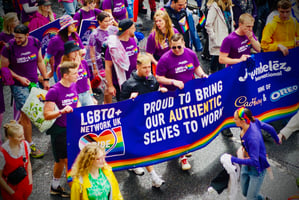High school students who view their gender expression as nonconforming to societal expectations for...
Risk of Child Abuse, PTSD Tied to Gender Nonconformity
Researchers have found a troubling association between gender nonconformity in children and abuse.
Childhood gender nonconformity is the term for differences from the norm for one’s sex as measured by feelings of femininity or masculinity and other indicators. It does not necessarily mean that a child will ultimately have a minority sexual orientation.
Exposure to childhood physical, psychological, and sexual abuse, and probable PTSD were higher in the 10 percent of youth reporting gender nonconformity, writes lead author Andrea Roberts, Ph.D., of the Harvard School of Public Health, in the March Pediatrics. The study was based on a survey of 9,864 youth as part of the Growing Up Today Study.
“[G]ender nonconformity…may be both an indicator of abuse and a risk factor for abuse, although evidence in favor of either causal direction is limited,” cautioned the researchers. Observing gender nonconformity should alert parents, teachers, and health care providers to a possibly increased risk of child abuse and therefore the chance to prevent, stop, or treat abuse, they concluded.
To read more about childhood sexual abuse in Psychiatric News, click here and here.
Exposure to childhood physical, psychological, and sexual abuse, and probable PTSD were higher in the 10 percent of youth reporting gender nonconformity, writes lead author Andrea Roberts, Ph.D., of the Harvard School of Public Health, in the March Pediatrics. The study was based on a survey of 9,864 youth as part of the Growing Up Today Study.
“[G]ender nonconformity…may be both an indicator of abuse and a risk factor for abuse, although evidence in favor of either causal direction is limited,” cautioned the researchers. Observing gender nonconformity should alert parents, teachers, and health care providers to a possibly increased risk of child abuse and therefore the chance to prevent, stop, or treat abuse, they concluded.
To read more about childhood sexual abuse in Psychiatric News, click here and here.
(Image: Velychko/Shutterstock.com)






